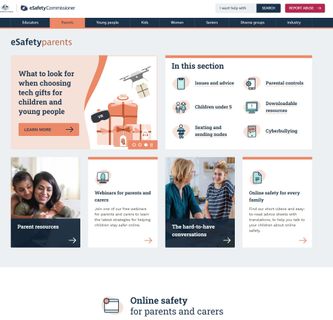eSafety - A Home and School Responsibility
The staff at Dominic College take eSafety very seriously
and part of our role as a school is to teach and inform our
children, staff, families, and the wider community about
the risks of electronic media, whilst also acknowledging
the many benefits that the internet can offer to help
student learning and wellbeing.
The e-Safety Commissioner website has been designed by
the Australian Government to help families and schools to
use education to keep our children safe online.
Our Don Bosco Oratory Program and Digital Technologies
courses help to teach our students to enjoy using
computers to aid their learning, but also help teach our
students to keep safe online. By talking to students openly,
and in an age specific way, families and the College can
work together to ensure that our young people are aware
of risks so that they know what to do when they happen.
Young people today, both Primary and Secondary students
can access the internet in so many ways (smart phones,
gaming devices, TVs, laptops, tablets and more). We need
to protect our children, as children naturally like to take
risks. It is never too early to start talking to your child and
keeping lines of communication open. The internet is
huge, and technology is fast evolving. At the same time
electronic media is an incredible tool, which supports
learning and is there to enjoy.
Common risks that families may encounter include:
• exposure to inappropriate content (e.g., age inappropriate material such as games, violence,
substance abuse, pornography)
• lifestyle websites (e.g., pro-anorexia, self-harm sites)
• hate sites
• grooming
• cyber-bullying in all forms
• identity theft
• privacy issues, including the disclosure of personal
information
• digital footprint and online reputation
• health and wellbeing (amount of time spent on the
internet/gaming)
• sexting (sending/receiving intimate messages)
• copyright
Age limits for certain websites are there for a reason, they
protect children whether they be on social networking
sites or on games children play.
There are many things you
can do as a family to keep children safe online.
What can we as parents and families do?
Ensure that lines of communication are open with children.
Spend time talking to your children, we do not let our
children cross the road without educating them first. Do
not ban them from the internet if things go wrong, talk
to them about it, and how it can be put right and how
technology can be used responsibly.
Read some of the links below from the eSafety
Commissioner site. There are some useful webinars and
tips on what to look out for and how to have conversations
with your children. Young people are often ahead of us
and use sites we know nothing about. These sites provide
practical advice.
Be aware of what your children are looking at and when.
Do they have access to the internet in their bedrooms? Are
they spending too long on electronic devices when they
could be outside having fun or spending time with the
family? Make sure that security is in place on all devices –
not just your main home computer.
Be aware that age restrictions are there for a reason – it is OK to say NO!
The school is keen to support our families regarding eSafety and the sites below
will help you to obtain useful and practical information:
eSafety Parents - https://www.esafety.gov.au/parents
Webinars for Parents- https://www.esafety.gov.au/parents/webinars
I know that families are aware of this issue, and I encourage you all to spend some
time looking at these great resources to help you keep informed so we can all
work together to best support our young people in being safe online and allow
them to use the benefits of technology responsibly.
Mr Steve Casni
College Principal
 A Catholic School in the Salesian Tradition
A Catholic School in the Salesian Tradition

 Facebook
Facebook iOS App
iOS App Android App
Android App

